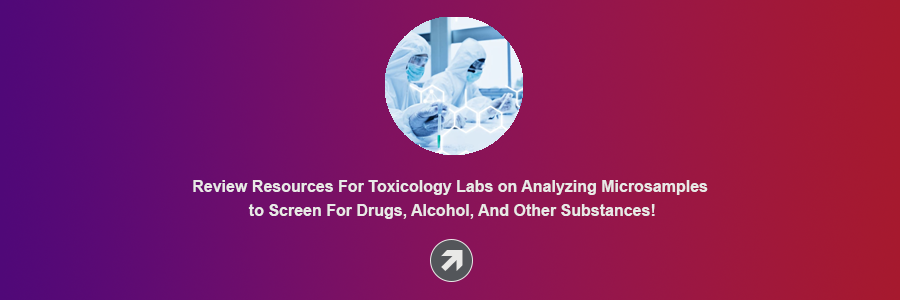Share this
how toxicology labs can deal with cuts in reimbursement
by Neoteryx Microsampling on Sep 13, 2018 12:32:00 AM
 Recently, the federal government made a move to cut reimbursements made to toxicology laboratories. This is expected to save the government over $3 billion in the next few years. Although this may make a positive impact to the federal government, the same cannot be said about toxicology laboratories in the U.S. The move to cut the amount of money budgeted for toxicology laboratories has both positive and negative impacts on them. Some of the impacts of these reimbursement cuts include:
Recently, the federal government made a move to cut reimbursements made to toxicology laboratories. This is expected to save the government over $3 billion in the next few years. Although this may make a positive impact to the federal government, the same cannot be said about toxicology laboratories in the U.S. The move to cut the amount of money budgeted for toxicology laboratories has both positive and negative impacts on them. Some of the impacts of these reimbursement cuts include:
- Decreased services. The fee cuts have reduced the services offered to the home-bound patient and house calls to such patients. The 24-hour emergency testing has also been stopped.
- A decrease in the workforce. Due to the cut on fee disbursed for this purpose, there has been a reduction of the workforce in some of the laboratories in order to adapt to the limited budget.
- Financial regulation. The cuts have also led to the adoption of new financial regulations by the laboratories in order to cope with the changes. Some laboratories are even evaluating the lists of their clients depending on the location, patient population, and cost.
How Laboratories Are Adapting to the Change
Despite the reimbursement cuts, most labs persist, and some even thrive. This is because the labs have applied, and are continuing to adopt, measures to cope with the cuts. Some of these adaptations include:
- Specializations. The laboratories are able to benefit from separate payment and reporting requirements by the Advanced Diagnostic laboratory tests.
- Consolidations. Laboratories can adapt to the cuts by use of strategic amalgamations as well as joint ventures. This will allow them an easier way of serving you.
- Contract negotiations. The laboratories can prioritize on contract negotiations with private payers and hospitals.
- Value addition. Professional lab experts can use their clinical experience to add value by advising clinicians on suitable test orders as well as giving intensified interpretations on the tests.
Though the reimbursement cuts will save the government a lot of money, they create obvious drawbacks for laboratories. With the right strategic adaptations, business can go on more or less as usual. If you are in the toxicology industry, these cuts should inspire your lab to come up with creative ways to remain solvent and viable.
While some labs are cutting long-term costs and streamlining operations, others are expanding their service offerings to include microsampling expertise, which will help them attract more customers and reap the rewards of a trend towards remote specimen collection for decentralized clinical trials, remote research studies, and more.
Visit our Toxicology Resources Page to learn more.

Share this
- Microsampling (206)
- Research, Remote Research (119)
- Venipuncture Alternative (105)
- Clinical Trials, Clinical Research (83)
- Mitra® Device (73)
- Therapeutic Drug Monitoring, TDM (51)
- Dried Blood Spot, DBS (39)
- Biomonitoring, Health, Wellness (30)
- Infectious Disease, Vaccines, COVID-19 (24)
- Blood Microsampling, Serology (23)
- Omics, Multi-Omics (21)
- Decentralized Clinical Trial (DCT) (20)
- Specimen Collection (18)
- Toxicology, Doping, Drug/Alcohol Monitoring, PEth (17)
- Skin Microsampling, Microbiopsy (14)
- hemaPEN® Device (13)
- Preclinical Research, Animal Studies (12)
- Pharmaceuticals, Drug Development (9)
- Harpera Device (7)
- Industry News, Microsampling News (5)
- Antibodies, MAbs (3)
- Company Press Release, Product Press Release (3)
- Environmental Toxins, Exposures (1)
- July 2025 (1)
- May 2025 (1)
- April 2025 (2)
- December 2024 (2)
- November 2024 (1)
- October 2024 (3)
- September 2024 (1)
- June 2024 (1)
- May 2024 (1)
- April 2024 (4)
- March 2024 (1)
- February 2024 (2)
- January 2024 (4)
- December 2023 (3)
- November 2023 (3)
- October 2023 (3)
- September 2023 (3)
- July 2023 (3)
- June 2023 (2)
- April 2023 (2)
- March 2023 (2)
- February 2023 (2)
- January 2023 (3)
- December 2022 (2)
- November 2022 (3)
- October 2022 (4)
- September 2022 (3)
- August 2022 (5)
- July 2022 (2)
- June 2022 (2)
- May 2022 (4)
- April 2022 (3)
- March 2022 (3)
- February 2022 (4)
- January 2022 (5)
- December 2021 (3)
- November 2021 (5)
- October 2021 (3)
- September 2021 (3)
- August 2021 (4)
- July 2021 (4)
- June 2021 (4)
- May 2021 (4)
- April 2021 (3)
- March 2021 (5)
- February 2021 (4)
- January 2021 (4)
- December 2020 (3)
- November 2020 (5)
- October 2020 (4)
- September 2020 (3)
- August 2020 (3)
- July 2020 (6)
- June 2020 (4)
- May 2020 (4)
- April 2020 (3)
- March 2020 (6)
- February 2020 (3)
- January 2020 (4)
- December 2019 (5)
- November 2019 (4)
- October 2019 (2)
- September 2019 (4)
- August 2019 (4)
- July 2019 (3)
- June 2019 (7)
- May 2019 (6)
- April 2019 (5)
- March 2019 (6)
- February 2019 (5)
- January 2019 (8)
- December 2018 (3)
- November 2018 (4)
- October 2018 (7)
- September 2018 (6)
- August 2018 (5)
- July 2018 (8)
- June 2018 (6)
- May 2018 (5)
- April 2018 (6)
- March 2018 (4)
- February 2018 (6)
- January 2018 (4)
- December 2017 (2)
- November 2017 (3)
- October 2017 (2)
- September 2017 (4)
- August 2017 (2)
- July 2017 (4)
- June 2017 (5)
- May 2017 (6)
- April 2017 (6)
- March 2017 (5)
- February 2017 (4)
- January 2017 (1)
- July 2016 (3)
- May 2016 (1)
- April 2016 (2)


No Comments Yet
Let us know what you think